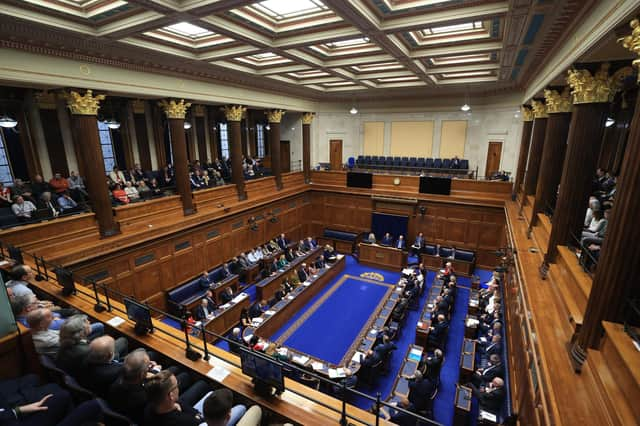Ben Lowry: Stormont seems unable even to debate a matter such the soaring cost of welfare, let alone control it


This is what the World Economic Forum’s Global Risks Report last year described as “related global risks with compounding effects”.
Advertisement
Hide AdAdvertisement
Hide AdThink of things that have happened since 2020: a world-wide pandemic, waves of immigration, soaring public debt, ongoing wealth inequality, increasing mental health problems, and bitter division over social and moral matters such as race, trans rights and abortion.
Then there has been deadly war in first eastern Europe, then the Middle East. Meanwhile, as someone who takes an armchair interest in extreme weather statistics, hottest temperature records in a number of countries such as France, England and Canada have not just been broken but smashed.
Many of these problems are evident in Northern Ireland. Not just physically (last year was our warmest ever, and the year before we hit our hottest ever temperature), but also in culture and politics.
I have great faith in this province’s potential, but think we illustrate in microcosm problems that form part of the polycrisis.
Advertisement
Hide AdAdvertisement
Hide AdConsider finances, which if anything are getting worse now Stormont is back. There is cross-party agreement that all aspects of public life need more cash from London.
The five main parties all, in effect, supported the strikes. I did not hear a single politician cite valuable benefits that public sector workers get such as long holidays (in parts of the sector they get six weeks holiday, and paid 14 public holidays, equivalent to almost nine weeks’ of paid leave) and pensions so generous they have bankrupted private companies offered the same.
There is no local political recognition that in an era in which people are living longer it costs far more to support them in old age (once people retired at 65 and lived to 70, now many people retire at 60 and live to 90). This puts so much strain on the NHS and that we might have to start charging younger people for prescriptions and for non urgent treatments in order to meet the growing cost of elderly care.
I have written before about how my late parents, who were fortunate to have good lives, did not get the end-of-life care they needed because of a chronic shortage of carers. People won’t go into caring because of low pay. This should trigger debate about whether we might need to trim the pay of some easy white collar jobs, which have no difficulty being filled, and diverting the funds towards the unglamorous but vital world of care for the disabled and elderly. But no such debate is being had at Stormont.
Advertisement
Hide AdAdvertisement
Hide AdMeanwhile, MLAs have for 20+ years ignored expert reports that NI needs a smaller number of better hospitals. This political cowardice means that NHS funds are inefficiently spent and is at the heart of NI’s waiting list crisis.
There is also no debate over welfare, the soaring UK-wide costs of which Rishi Sunak’s government is planning (belatedly) to control. The prime minister warned against "over-medicalising the everyday challenges and worries of life". I would go further and say that workplaces could become unmanageable given the rise in of people, particularly the young, who say they can’t cope with such challenges.
Over the years I have been shouted down when I tried to advance arguments in favour of basic attempts to control welfare expenditure, such as the so-called bedroom tax (which in fact ended a subsidy for spare rooms).
I had no support in 2016 when I pointed out that almost 12% of Northern Ireland’s population was on Disability Living Allowance (DLA), almost one person in eight of the entire population. The number of people claiming to be too ill to work has grown significantly across the UK since covid.
Advertisement
Hide AdAdvertisement
Hide AdWhen in 2020 I pointed out that the surge in children claiming special educational needs (almost one in five) was unsustainable, two Sinn Fein MPs joined attacks on me: Chris Hazzard accused me of “spouting bile about vulnerable children” (a contemptible misrepresentation of my position) and Michelle Gildernew said I had “hit a new low”.
Out-of-control welfare is at the heart of the polycrisis is hitting western countries around the world. I think first world countries are now so rich that voters have fantasy demands of perfection in their personal and public lives. Stormont could not possibly prevent NI from suffering from problems that affect so many nations. The problem is that it does not seem capable of even managing or mitigating those problems.
Ben Lowry (@BenLowry2) is News Letter deputy editor